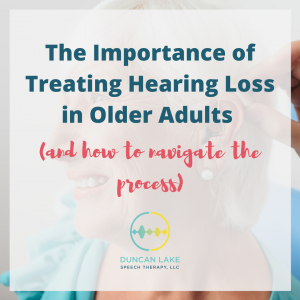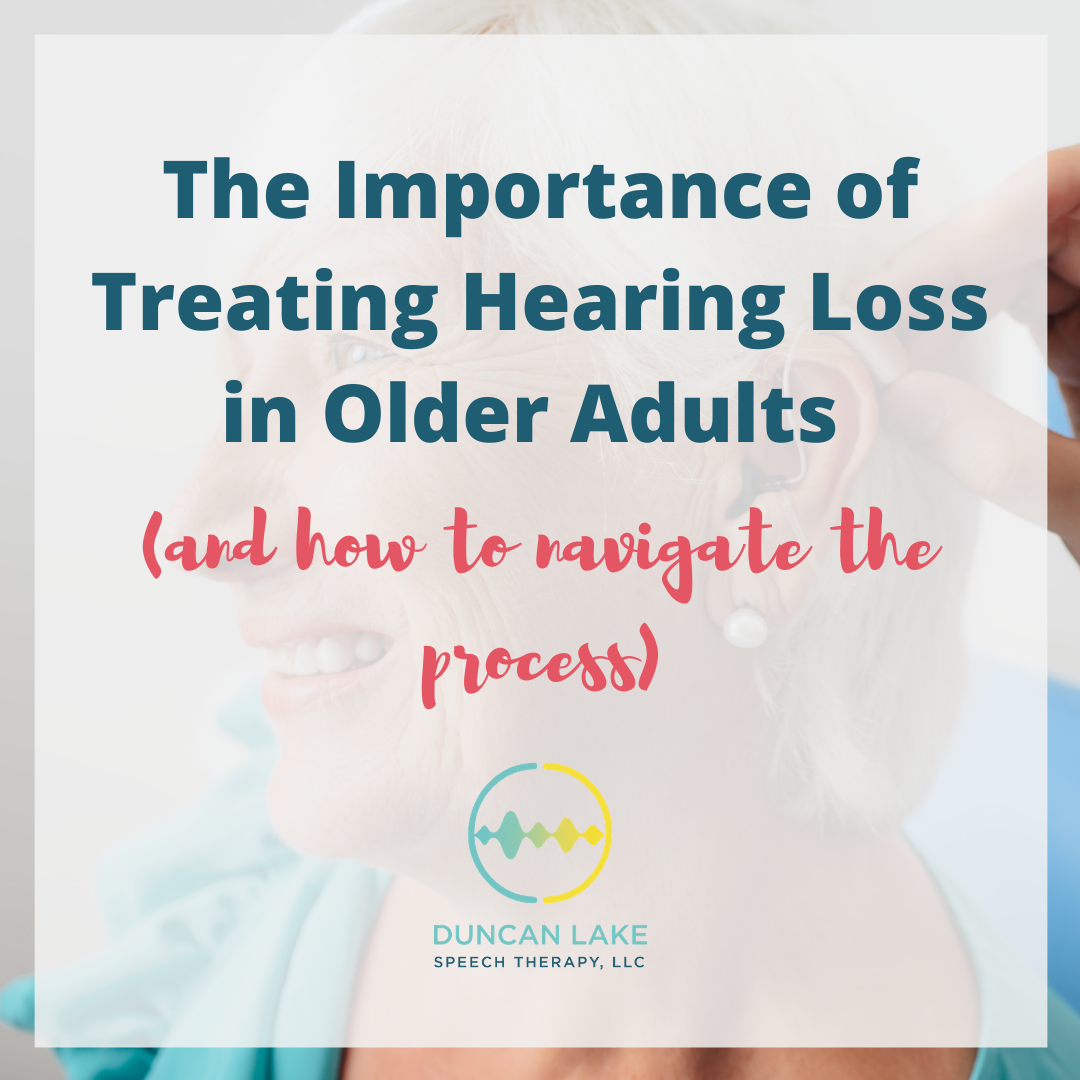Age-related hearing loss is a touchy subject for many. Many times, it forces the individual to come to terms with becoming “older,” which isn’t fun. It also plays into insecurities regarding “being different” or “standing out” because of a hearing aid. Well, I’m here to tell you that it’s time to set these worries aside and start the process of addressing hearing loss.
“Why should I?” you may ask. “Also, aren’t you a speech-language pathologist? Why are you talking about this?” Well, a few things.
First of all, untreated hearing loss can be confused for dementia by loved ones. That makes sense. Let’s say someone is having a conversation with their spouse about their workday. If the spouse has untreated hearing loss, they might respond to a question or comment with something completely off-base. They also might not hear directions or reminders for appointments or dates correctly (or at all). When the individual doesn’t show up for an appointment or doesn’t follow through on directions, it might look like they’re forgetful. This is a dangerous mix-up (and is also why regular hearing checks should occur)!
Speaking of dementia, a late 2019 study out of Taiwan reported that “[hearing loss] was associated with a significant increase in the risk of dementia, especially in patients aged 45 to 64 years.” This also makes a lot of sense. There are several risk factors associated with dementia. While genetics and age play a role, additional risk factors can include previous healthy lifestyle factors (diet, exercise, etc.) and social and cognitive stimulation (or lack thereof). If someone can’t hear, they’re less likely to be social and less likely to participate in activities that once made them happy, potentially leading to an inactive social life. This, in turn, could lead to depression, another risk factor for dementia.
So let’s get that hearing loss treated, OK? How do you this? Piece of cake.

-
Get a referral to an audiologist. You’re going to have to call your insurance about this. I’m not even going to begin to guess as to what everyone’s individual coverage is for this, but all one has to do is ask their primary care provider for a referral. Check with your insurance to make sure your audiologist is covered. Some PCPs even do hearing screenings right in their office to see if a referral is needed!
If you live in an area where there is a audiology or speech-language pathology university program, often times their clinics will offer these services for free. Call and ask!
-
Go to the audiologist. Make sure you show up. It might seem a little intimidating, but as just about every adult in my life has said to me, “80% of success is just showing up.” The audiologist will do some tests with you including a full-scale hearing test (the “raise your hand” test), a tympanometry measure (measures your ear drum function), some word tests to see how well you can hear speech sounds in noise, and inner ear reflex tests. None of these hurt and, for any nerds like me out there, are fascinating to learn about.
-
Get the results and come up with a plan. If your hearing evaluation came back with hearing loss, then it’s time to make a plan. Your audiologist will work with you to pick a hearing device that will best suit your needs. Gone are the days of having only one behemoth hearing aid as an option. There are so many to choose from with so many different functions. Some have Bluetooth capability! Some have noise reducing capabilities! The list goes on and on. Your audiologist will really work with you to help you make the best choice in hearing aid.
Hearing aids can range in cost from very minimal to thousands of dollars. Be sure to have an open conversation with your audiologist about your price limit. Also, call your insurance to ensure it is covered.
-
You’re probably going to have to follow up with the audiologist. Unfortunately, no amount of hearing aid amplification is going to bring back your hearing to its youthful existence. However, it can significantly increase the amount of sounds you’re able to hear. However, it’s going to take some getting used to, and that’s OK. You’ll have to practice wearing your hearing aids in a variety of settings (in quiet, in public, on the phone, etc.), and it may need to be adjusted after you’ve worn it for a bit. Don’t be discouraged if things sound funny or different. Instead, follow up with your audiologist. Sometimes, a follow up appointment or two is built into the cost of the initial hearing aid visit.
-
Depending on what’s going on, you might need to see a speech-language pathologist. They will work with you on some aural rehabilitation (or hearing-based) therapy to help you learn ways to compensate or adjust to your new hearing aids. Ask your audiologist for some names!
Take care of your ears, and if you have any question, your friendly, neighborhood speech-language pathologist is here to help.



Recent Comments